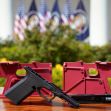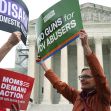On Tuesday, the Supreme Court ruled the Biden administration’s ban on so-called “ghost guns” can remain in effect for the time being, pausing a lower court decision.
The regulation issued by the Bureau of Alcohol, Tobacco, Firearms, and Explosives (ATF) was struck down in June by a federal court. In an emergency ruling, the Court ruled to stay the decision while the matter continues on appeal.
The case concerns firearm-making kits available for purchase online. Virtually anyone can buy one of these kits and assemble a “ghost gun” at home, free of serial numbers. The Biden administration has emphasized the threat to public safety posed by universally available firearms that are extremely difficult to trace.
The ATF sought to address the increased prevalence of ghost guns. In 2022, the agency issued a rule clarifying that federal regulations pertaining to the sale of “firearms” apply to ghost guns. The administration claims they have the power to regulate ghost guns the same as firearms manufactured and sold through the traditional process.
In particular, the ATF sought to expand the scope of two federal gun law provisions. First, the agency claims the law’s definition of “firearm” includes certain parts kits. Second, the ATF rule would include assemblable gun parts within the definition of “frame or receiver.” The rule would extend gun sale regulations to ghost gun providers, including requirements pertaining to gun sale licenses, background checks, serial numbers, and record-keeping.
Gun rights advocacy groups, firearm manufacturers, and sellers of ghost gun kits challenged the ATF rule, arguing that it was inconsistent with existing federal gun laws. Opponents of the law contend the ATF went beyond its purview and sought to regulate “items that are not firearms and which Congress never envisioned it regulating.” At least two courts have ruled in favor of the government in parallel challenges to the rule but, in June, a federal judge in Texas struck down the rule nationwide.
The Biden administration appealed the decision to the 5th Circuit Court of Appeals. The 5th Circuit agreed to fast-track the appeal but refused to stay the lower court’s decision. The government then asked the Supreme Court to intervene.
The Justice Department argued that the lower court’s order would permit an unknowable number of ghost guns to be disseminated while the case moved through the courts. Allowing the injunction to take effect “would let tens of thousands of untraceable ghost guns flow into our Nation’s communities — with many going to felons, minors, or those intending to use them in crimes.” By the time the matter is decided, “the damage done.” In contrast, if the Court were to put the ruling on hold, ghost gun manufacturers would merely have to comply with the same existing regulations that already apply to other commercial firearm sales.
The government also argued that permitting any district court to issue a nationwide injunction created perverse incentives and an odd power imbalance. Challengers of a law can lose case after case until they find one favorable judge, who then imposes their will across the entire country. The lone district judge striking down the law suddenly has “veto power” over every other court that sided with the government. The rule’s challengers responded that “Congress made the judgment that on balance vacatur should be allowed, and Congress remains free to revisit that judgment at any time.”
The Supreme Court ruled 5-4 to stay the district court’s decision while the matter proceeds on appeal. Chief Justice Roberts and Justice Amy Coney Barrett joined the three liberal justices in issuing the stay. The Court’s other conservative justices--Thomas, Alito, Gorsuch, and Kavanaugh--indicated they would have denied the application for a stay. The order and the dissent were issued without opinion or explanation.
The case may eventually find its way back to the nation’s high court for a decision on the merits.






